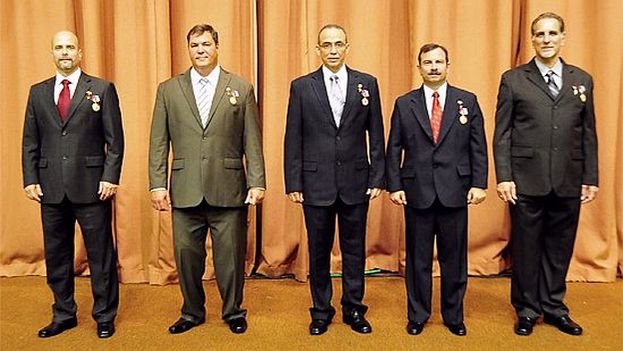
![]() 14ymedio, Boris Gonzalez Arenas, Havana, 11 August 2016 — My friend Adriana Gutierrez suggested I write this, only asking that, out of respect for her father, I change the names. She has lived in Spain since 2007, when she went to do a degree that also offered the occasion to stay and live outside of Cuba. Her father and mother remained in Cuba. Let’s call her dad Anibal Ochoa to use the last name of his great friend Arnaldo Ochoa Sanchez, the general executed or murdered, or both as it appears, in 1989. Adriana and her father don’t have the same last name because he wasn’t her biological father, but the man who took on caring for her and did it in the best way he knew how, considering that she was also his only daughter.
14ymedio, Boris Gonzalez Arenas, Havana, 11 August 2016 — My friend Adriana Gutierrez suggested I write this, only asking that, out of respect for her father, I change the names. She has lived in Spain since 2007, when she went to do a degree that also offered the occasion to stay and live outside of Cuba. Her father and mother remained in Cuba. Let’s call her dad Anibal Ochoa to use the last name of his great friend Arnaldo Ochoa Sanchez, the general executed or murdered, or both as it appears, in 1989. Adriana and her father don’t have the same last name because he wasn’t her biological father, but the man who took on caring for her and did it in the best way he knew how, considering that she was also his only daughter.
Anibal spent his whole life as an official in the Ministry of Foreign Affairs, and his specialty was to plant spies in Spain to travel around the rest of Europe or, to continue with the language of farming, to harvest them when they were totally worn out and return them to Cuba with false identities and all kinds o technical intricacies.
He was also a racist who despised his daughter’s black lovers, when she had them, and was macho enough not to rest until his wife, Adriana’s mom – let’s call her Leonor – left her job as a nurse to devote herself to being a housewife. She was a woman who spoke in a measured way and smiled more with her eyes than with her mouth. A beautiful smile that she passed down to Adriana.
Even after retirement, Anibal went to the Foreign Ministry to advise new diplomats in the art of shaking hands without giving away the knives up their sleeves and smiling discretely so as not to show their fangs. But, as his era coincided with the aggressive years of the Cold War, a time when a Cuba financed by the Soviets lacked the intelligence to profitably manufacture a pencil, although it played at being a military power, Anibal’s advice seemed more like funny anecdotes than plausible directions. Anibal, who was no fool, quickly understood and, as he had his pride, he ended up distancing himself from Cuba’s Foreign Ministry.
Almost simultaneously his wife died and his two grandchildren were born in Seville. Retirement did not suit him and slowly he slipped into the old age of an ordinary Cuban, making him a man dependent on help from his daughter.
Shortly after being widowed he returned to Spain for the first time after two decades. He feared being denied a visa, something that his former enemies were in charge of and that emphasized his current impotence. But none of this happened and he got the visa. He was there three months and when he returned we talked a lot. He was happy, and in addition, as expected, he had slimmed down and his skin cleared up. Then there was a second visit and he stayed a year, and eventually he stayed for good.
Two months ago Anibal died of a heart attack at 79 and took his secrets to his grave, some of which he regretted and so decided not to share with anyone, even after so much time and distance from his career as an official, a diplomat and a spy.
Adriana said that Anibal once commented he had been used. Perhaps he also thought about Arnaldo Ochoa and concluded that he had had better luck than his deceased friend. At the death of the Cuban general, Anibal was out of work for some time, understanding nothing and unable to pretend that he did. They say that something happened to Raul Castro at this time that only aggravated his alcoholism. Later, Anibal recovered and took up his previous duties, which would never be the same, because the death of the Cuban general coincided with the end of Soviet socialism and, still unable to produce a pencil, the Cuban state sank too deeply into misery to support any James Bonds.
In Spain, Hannibal used to be welcome to sit in outdoor cages, which he also did in the 70s and 80s, but he was too self-absorbed and distrustful to enjoy anything.
Hannibal had a peaceful death, surrounded by his daughter and grandchildren as he always wanted, in the country he treated throughout his working life as an enemy and where he settled, in retirement, as a home.
